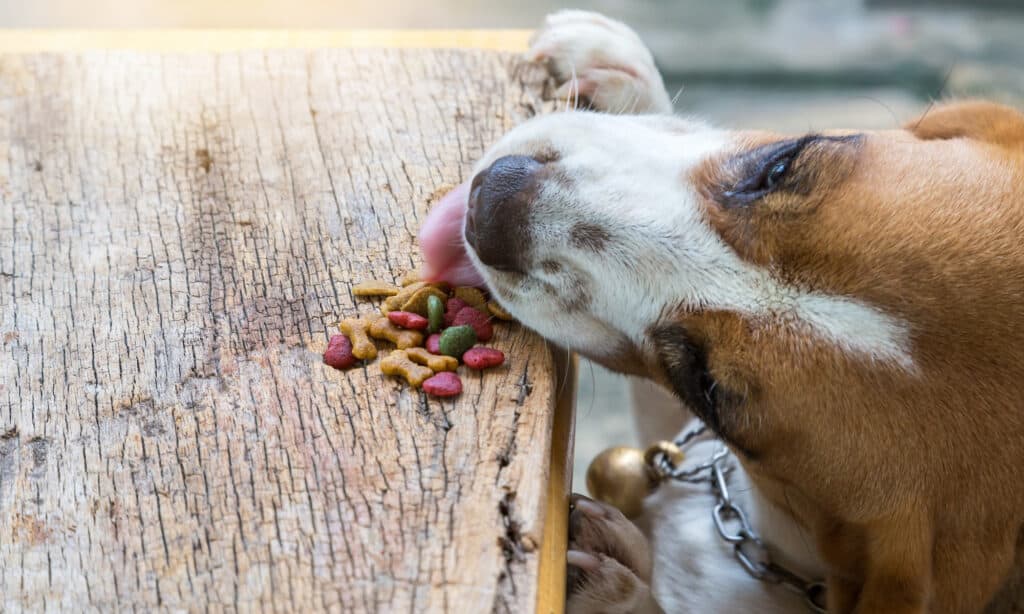As loving pet owners, we always strive to provide the best possible care for our furry friends. Just like humans, dogs require a healthy, well-functioning digestive system to live happy and active lives. With a myriad of digestive supplements and specialized dog foods on the market, navigating the world of canine gut health can be overwhelming. Fear not, fellow dog lovers! In this blog, we’ll explore the incredible benefits of prebiotics, probiotics, and digestive enzymes, and how they can work together to support your dog’s overall health and well-being. Get ready to embark on a journey towards better digestion and happier tails with our comprehensive guide to boosting your dog’s gut health, naturally.

Boosting Your Dog’s Digestive Health Naturally
A healthy and balanced diet plays a crucial role in supporting your dog’s overall well-being, but sometimes, even the most nutritious meals could use a little extra help. To give your dog’s digestive system a natural boost, it’s essential to understand the roles that prebiotics, probiotics, and digestive enzymes play in their gut health. By incorporating these elements into your dog’s diet, you’ll be promoting a strong immune system, reducing the risk of digestive upsets, and ensuring they get the most out of their meals.
As pet owners, we often hear about the latest trends and supplements for our dogs, but it’s important to remember that not all supplements are created equal. Instead of relying on marketing gimmicks or flashy packaging, focus on understanding the science behind these natural digestive aids and how they can truly benefit your dog. Keep in mind that every dog is unique, and their individual needs might vary based on their breed, age, and overall health condition. Before making any significant changes to your dog’s diet, it’s always wise to consult with your veterinarian to ensure the best possible outcome.
In this blog, we’ll delve into the specifics of prebiotics, probiotics, and digestive enzymes, providing you with the knowledge you need to make informed decisions about your dog’s dietary needs. By choosing natural and scientifically-backed solutions, you’ll be well on your way to improving your dog’s digestive health and overall happiness. After all, a healthy gut is the foundation of a happy dog!
Prebiotics: Unlocking the Power of Dietary Fibers for Your Dog’s Gut
As we dive into the world of canine gut health, let’s begin by exploring the wonders of prebiotics. These naturally occurring dietary fibers have a significant impact on your dog’s digestive system, paving the way for better nutrient absorption and promoting overall well-being. By unlocking the potential of prebiotics, you’re not only fostering a healthy gut environment but also contributing to a stronger immune system and reduced inflammation in your furry friend. In this section, we’ll help you understand what prebiotics are, how they benefit your dog, and the best sources to incorporate them into your dog’s diet. Get ready to discover the power of these essential fibers and how they can contribute to a happier, healthier dog.

What Are Prebiotics and How Do They Benefit Your Dog?
Prebiotics are a type of nondigestible fiber that serves as food for the beneficial bacteria residing in your dog’s gut. These fibers pass through the digestive system mostly intact, reaching the large intestine where they are fermented by the good bacteria. In turn, this fermentation process stimulates the growth and activity of these beneficial microorganisms, contributing to a balanced and healthy gut environment.
But how exactly do prebiotics benefit your dog? Here are some key advantages of incorporating prebiotics into your furry friend’s diet:
- Improved gut health: By promoting the growth of beneficial bacteria, prebiotics help maintain a healthy balance of gut flora. This balance is essential for optimal digestion, nutrient absorption, and overall gut function.
- Enhanced immune system: A well-balanced gut microbiome plays a significant role in supporting your dog’s immune system. By fostering the growth of good bacteria, prebiotics help protect your dog from harmful pathogens and reduce the risk of infection.
- Reduced inflammation: Prebiotics have been shown to possess anti-inflammatory properties. By maintaining a healthy gut environment, they can help reduce inflammation throughout your dog’s body, which can be particularly beneficial for dogs with chronic conditions such as arthritis or inflammatory bowel disease.
Understanding the benefits of prebiotics is just the beginning. In the next section, we’ll explore the best sources of prebiotics for your dog, both from natural foods and supplements.
Top Reasons to Add Prebiotics to Your Dog’s Diet
As we’ve already touched upon the benefits of prebiotics, let’s dive deeper into the top reasons why you should consider adding them to your dog’s diet. Embracing prebiotics can lead to a range of positive outcomes that contribute to your dog’s overall well-being and happiness.
- Optimal digestion: A balanced gut microbiome is crucial for efficient digestion. By promoting the growth of beneficial bacteria, prebiotics help break down food, allowing your dog to absorb and utilize essential nutrients more effectively.
- Stronger immunity: A healthy gut is closely linked to a robust immune system. By supporting the growth of good bacteria, prebiotics help your dog fend off harmful pathogens and maintain a healthy immune response.
- Weight management: Prebiotics can contribute to better weight management in dogs by supporting a healthy metabolism and maintaining the right balance of gut bacteria. This can be particularly beneficial for overweight dogs or those prone to obesity.
- Reduced gastrointestinal issues: By fostering a balanced gut microbiome, prebiotics can help alleviate common gastrointestinal issues such as diarrhea, constipation, and bloating, making your dog more comfortable and happy.
- Improved skin and coat health: A well-functioning digestive system, supported by prebiotics, can lead to healthier skin and a shinier coat, as proper nutrient absorption is essential for maintaining skin and coat health.
- Better overall health: A balanced gut microbiome plays a key role in overall health. By supporting your dog’s digestive system with prebiotics, you’re not only contributing to their gut health but also promoting overall well-being and vitality.
Adding prebiotics to your dog’s diet is an investment in their long-term health and happiness. In the following section, we’ll discuss the best natural and supplemental sources of prebiotics to help you make the right choice for your furry friend.

Best Natural and Supplemental Sources of Prebiotics for Dogs
Now that you understand the benefits of prebiotics for your dog’s health, it’s time to discover the best sources to incorporate them into your furry friend’s diet. With both natural and supplemental options available, finding the perfect fit for your dog’s specific needs is a breeze.
Natural Sources:
- Chicory root: Packed with inulin, a prebiotic fiber, chicory root is a fantastic choice for promoting a healthy gut in your dog. You can find chicory root in powder form or as an ingredient in some high-quality dog foods.
- Jerusalem artichoke: Also known as the sunchoke, this root vegetable is another excellent source of inulin. Jerusalem artichoke can be incorporated into your dog’s diet in small amounts, either raw or cooked.
- Dandelion greens: These nutrient-rich leafy greens not only contain essential vitamins and minerals but also boast prebiotic fiber that supports gut health. Add chopped, fresh dandelion greens to your dog’s meals or look for dog food that includes them as an ingredient.
- Apples and bananas: Both apples and bananas provide pectin, a soluble fiber with prebiotic properties. When introducing these fruits to your dog’s diet, do so in moderation to avoid digestive upset, and remember to remove any seeds or peels.
Supplemental Sources:
- Inulin-based supplements: Derived from plant sources like chicory root or Jerusalem artichoke, inulin supplements can be easily mixed into your dog’s food.
- Fructooligosaccharides (FOS): FOS is a type of prebiotic fiber commonly found in supplements and is ideal for supporting your dog’s gut health, especially if they’re experiencing digestive issues.
- Prebiotic-enhanced dog foods: Some high-quality dog foods are specifically formulated with added prebiotics to promote gut health. Look for brands that list prebiotic fibers such as inulin, FOS, or other plant-based fibers in their ingredient list.
When adding prebiotic-rich foods or supplements to your dog’s diet, remember to introduce them gradually to prevent potential gastrointestinal discomfort. As always, consult with your veterinarian before making any significant changes to your dog’s diet to ensure they’re receiving the proper balance of nutrients and prebiotics for their unique needs.

Probiotics: Strengthening Your Dog’s Gut with Beneficial Bacteria
Now that we’ve explored the world of prebiotics, let’s shift our focus to another essential component of your dog’s gut health: probiotics. These living microorganisms work hand-in-hand with prebiotics to support a balanced and thriving gut microbiome. In this section, we’ll demystify probiotics, explain their role in canine digestion, and discuss the many benefits they offer for your dog’s overall health. Moreover, we’ll provide you with guidance on natural probiotic foods and supplements that your dog will enjoy. Get ready to learn how to fortify your dog’s gut with the power of beneficial bacteria, paving the way for a happier, healthier life for your four-legged companion.
Understanding Probiotics and Their Role in Canine Digestion
Probiotics are live microorganisms that benefit your dog’s gut health. They live in the digestive system, helping to maintain a healthy balance of good and bad bacteria. This balance is vital for your dog’s overall well-being.
So, what role do probiotics play in canine digestion? Here are some key points:
- Boost nutrient absorption: Probiotics help break down food, making it easier for your dog to absorb essential nutrients. This means your furry friend gets the most out of their meals.
- Maintain gut balance: A healthy gut has both good and bad bacteria. Probiotics help keep this balance by supporting the growth of beneficial bacteria and preventing harmful ones from taking over.
- Strengthen the immune system: A balanced gut microbiome is crucial for a strong immune system. Probiotics support your dog’s immunity by maintaining a healthy gut environment.
- Alleviate digestive issues: Probiotics can help reduce common gastrointestinal problems like diarrhea, constipation, and bloating. This makes your dog feel more comfortable and happy.
In the next sections, we’ll explore the benefits of probiotics for your dog and discuss the best natural and supplemental sources to add to their diet.

Key Benefits of Probiotics for a Happy and Healthy Dog
Incorporating probiotics into your dog’s diet can bring about numerous benefits, ultimately leading to a happier and healthier life for your furry friend. Let’s take a closer look at some of the key advantages of probiotics for your canine companion:
- Improved digestion: Probiotics support the digestive process by helping to break down food and enhance nutrient absorption. This leads to more efficient digestion and better overall gut health for your dog.
- Stronger immune system: A well-balanced gut microbiome plays a significant role in your dog’s immune system. Probiotics contribute to this balance by promoting the growth of beneficial bacteria, thus helping to ward off harmful pathogens.
- Reduced gastrointestinal issues: Incorporating probiotics into your dog’s diet can alleviate common digestive problems like diarrhea, constipation, and gas. By easing these symptoms, your dog will feel more comfortable and content.
- Enhanced skin and coat health: A healthy digestive system, supported by probiotics, can result in improved skin and coat health. Proper nutrient absorption is crucial for maintaining a vibrant coat and healthy skin.
- Weight management support: Probiotics can help regulate your dog’s appetite and metabolism, contributing to better weight management. This can be particularly beneficial for dogs prone to obesity or those on a weight loss journey.
By understanding the key benefits of probiotics, you’re one step closer to helping your dog achieve optimal health and happiness. In the following sections, we’ll explore the best natural and supplemental sources of probiotics for your canine companion.
Natural Probiotic Foods and Supplements Your Dog Will Love
Introducing probiotics into your dog’s diet can be simple and enjoyable with the right choices. Both natural foods and supplements offer excellent sources of probiotics to help your furry friend achieve optimal gut health. Let’s explore some of the best options that your dog will surely appreciate:
Natural Probiotic Foods:
- Plain yogurt: Yogurt is a fantastic source of beneficial bacteria, particularly Lactobacillus and Bifidobacterium strains. Opt for plain, unsweetened yogurt without any added sugars or artificial sweeteners, as these can be harmful to your dog.
- Kefir: This fermented milk drink is packed with probiotics and offers a similar taste and texture to yogurt. Kefir can be an excellent option for dogs with lactose intolerance, as the fermentation process breaks down most of the lactose.
- Fermented vegetables: Sauerkraut, kimchi, and other fermented veggies are rich in probiotics. When adding these to your dog’s diet, opt for low-sodium, unsweetened versions, and introduce them gradually to avoid digestive upset.
Probiotic Supplements:
- Canine-specific probiotics: Many probiotic supplements are designed specifically for dogs, containing strains of beneficial bacteria known to support canine gut health. Look for reputable brands and follow the recommended dosages.
- Multi-strain probiotics: Supplements containing multiple strains of probiotics can offer a broader range of benefits for your dog’s gut health. Look for products with a variety of strains, such as Lactobacillus, Bifidobacterium, and Enterococcus.
- Probiotic chews and treats: Some companies offer probiotic-infused chews and treats, making it easy and enjoyable for your dog to get their daily dose of beneficial bacteria.
Always consult with your veterinarian before introducing new probiotic foods or supplements to your dog’s diet. They can provide guidance on the best choices and appropriate dosages for your dog’s specific needs. With the right probiotic sources, your furry friend will be on the path to better gut health and overall well-being.

Digestive Enzymes: Enhancing Nutrient Absorption for Optimal Canine Health
As we’ve explored the benefits of prebiotics and probiotics, it’s now time to delve into another essential component of your dog’s digestive health: digestive enzymes. These vital proteins play a crucial role in breaking down the food your dog consumes, allowing them to absorb the nutrients necessary for maintaining overall health and well-being. In this section, we’ll shed light on the importance of digestive enzymes in your dog’s diet, explain how they function, and discuss how to ensure your furry friend receives the right balance of these enzymes. Get ready to learn about the power of digestive enzymes and how they can unlock the full potential of your dog’s nutrition, paving the way for a thriving and healthy life.
The Crucial Role of Digestive Enzymes in Your Dog’s Diet
Digestive enzymes are essential proteins that play a significant role in your dog’s overall health. These enzymes break down food into smaller, absorbable nutrients, ensuring your canine companion gets the most out of their meals. Let’s take a closer look at the crucial role of digestive enzymes in your dog’s diet:
- Breaking down food: Digestive enzymes are responsible for breaking down various components of your dog’s food, such as proteins, fats, and carbohydrates. This process allows your dog to absorb essential nutrients more easily.
- Supporting nutrient absorption: By breaking down food into smaller particles, digestive enzymes help improve nutrient absorption in the gut. This means your dog can utilize the full potential of their diet, leading to better health and well-being.
- Enhancing gut health: A well-functioning digestive system, supported by digestive enzymes, promotes a healthy gut environment. This, in turn, contributes to a balanced microbiome and a robust immune system.
- Alleviating digestive issues: When your dog’s digestive system is working efficiently, it can help reduce common gastrointestinal problems like diarrhea, constipation, and bloating. This results in a more comfortable and content dog.
Understanding the critical role of digestive enzymes in your dog’s diet is essential for ensuring they receive the proper nutrition they need to thrive. In the following sections, we’ll discuss natural sources of digestive enzymes and explore how to choose the right enzyme supplements for your furry friend.

Why Your Dog Needs Digestive Enzymes for Better Health
Providing your dog with the necessary digestive enzymes is crucial for their overall health and well-being. These enzymes not only support efficient digestion but also contribute to various other aspects of your dog’s wellness. Let’s explore some reasons why digestive enzymes are essential for better health in your canine companion:
- Improved nutrient absorption: Digestive enzymes break down food into smaller, more accessible nutrients, allowing your dog to absorb and utilize them more effectively. This ensures your dog receives the full nutritional value from their meals.
- Stronger immune system: A healthy and efficient digestive system, supported by digestive enzymes, contributes to a balanced gut microbiome. This balance is vital for a robust immune system, helping your dog fend off illnesses and infections.
- Enhanced energy levels: When your dog can efficiently digest and absorb nutrients from their food, they’ll have more energy to enjoy their daily activities. A well-functioning digestive system is essential for maintaining your dog’s energy levels and overall vitality.
- Alleviated digestive issues: Ensuring your dog receives adequate digestive enzymes can help reduce common gastrointestinal problems, such as diarrhea, constipation, and gas. A comfortable and happy dog is more likely to be healthy and active.
- Support for senior dogs or dogs with health issues: Aging dogs or those with specific health conditions may have a reduced ability to produce digestive enzymes naturally. Supplementing with enzymes can help support their digestive process, leading to better overall health.
By recognizing the importance of digestive enzymes for your dog’s health, you can make informed decisions about their diet and nutritional needs. In the next section, we’ll explore natural sources of digestive enzymes and how to choose the right enzyme supplements for your furry family member.
Top Sources of Digestive Enzymes for Dogs: Natural and Supplemental
Ensuring your dog receives the necessary digestive enzymes can be achieved through both natural foods and supplements. Here, we’ll explore some of the top sources of digestive enzymes for your canine companion, so you can make the best choice for their unique needs:
Natural Sources:
- Raw fruits and vegetables: Certain fruits and vegetables, such as papaya, pineapple, and kiwi, are rich in digestive enzymes. Additionally, leafy greens and cruciferous vegetables like broccoli and cauliflower can provide beneficial enzymes. Be sure to introduce these foods gradually and in moderation.
- Raw or lightly cooked meats: Raw or lightly cooked meats contain naturally occurring enzymes that can aid in digestion. However, it’s essential to discuss raw feeding with your veterinarian before making any dietary changes to ensure it’s appropriate for your dog.
- Fermented foods: Some fermented foods, such as kefir and sauerkraut, provide digestive enzymes alongside probiotics. Be cautious with portion sizes and opt for low-sodium, unsweetened versions when adding these foods to your dog’s diet.
Supplemental Sources:
- Canine-specific enzyme supplements: Many enzyme supplements are designed specifically for dogs and contain a blend of enzymes to target proteins, fats, and carbohydrates. Look for reputable brands and follow the recommended dosages.
- Broad-spectrum enzyme supplements: These products offer a wide range of enzymes to support your dog’s digestion, ensuring they receive a comprehensive blend for optimal nutrient absorption.
- Digestive health chews and treats: Some companies offer enzyme-infused chews and treats, making it easy and enjoyable for your dog to receive the digestive support they need.
Always consult with your veterinarian before introducing new digestive enzyme sources, whether natural or supplemental, to your dog’s diet. They can provide guidance on the best choices and appropriate dosages for your dog’s specific needs. By providing your dog with the right balance of digestive enzymes, you’re paving the way for better health and overall well-being.

Integrating Prebiotics, Probiotics, and Digestive Enzymes into Your Dog’s Diet: Expert Tips
By now, you’ve learned about the incredible benefits of prebiotics, probiotics, and digestive enzymes for your dog’s health and well-being. But how can you seamlessly integrate these essential components into your furry friend’s diet? In this section, we’ll share expert tips and strategies to help you incorporate prebiotics, probiotics, and digestive enzymes into your dog’s daily meals, ensuring they receive the optimal nutritional support they need. From selecting the best natural sources to choosing the right supplements, we’ve got you covered. Get ready to embark on a journey toward improved digestive health for your canine companion, paving the way for a happy and thriving life.
When to Consult Your Veterinarian for Dietary Changes
As you consider integrating prebiotics, probiotics, and digestive enzymes into your dog’s diet, it’s crucial to know when to consult your veterinarian for guidance. Making dietary changes can impact your dog’s health, and it’s essential to ensure you’re making the best choices for their unique needs. Here are some situations when you should consult your vet before making any changes:
- Existing health conditions: If your dog has any pre-existing health conditions, it’s essential to discuss dietary changes with your veterinarian. They can help determine if prebiotics, probiotics, or digestive enzymes are suitable and recommend the best options for your dog’s specific needs.
- Allergies or food sensitivities: If your dog has known allergies or sensitivities, consult your vet before introducing new foods or supplements. They can help you identify safe options and ensure you avoid any potential adverse reactions.
- Age-related considerations: Puppies, senior dogs, or dogs with age-related health issues may have unique nutritional requirements. Speak with your vet about the best ways to integrate prebiotics, probiotics, and digestive enzymes to support their overall health.
- Weight management concerns: If your dog is overweight or struggles with weight management, consult your veterinarian. They can guide you on incorporating prebiotics, probiotics, and digestive enzymes to support your dog’s weight loss journey.
- Inconsistent or unusual symptoms: Consult your vet before changing your dog’s diet if they have irregular digestive issues. They can help identify any underlying issues that may require further investigation or treatment.
Your veterinarian is a valuable resource in guiding you through dietary changes for your dog. By consulting with them, you can ensure you’re making informed decisions and providing the best nutritional support for your canine companion’s unique needs.

How to Gradually Introduce New Ingredients for Maximum Benefits
When incorporating prebiotics, probiotics, or digestive enzymes into your dog’s diet, it’s essential to do so gradually to ensure maximum benefits and minimize any potential side effects. Introducing new ingredients slowly will give your dog’s digestive system time to adjust, reducing the risk of digestive upset. Here are some tips for gradually introducing new ingredients into your dog’s meals:
- Start small: Begin by adding a small amount of the new ingredient or supplement to your dog’s current diet. This allows you to monitor their response and ensure they don’t experience any adverse reactions.
- Incremental increases: Gradually increase the amount of the new ingredient over a period of 1-2 weeks. This gives your dog’s digestive system time to adjust to the new addition, minimizing the risk of gastrointestinal issues.
- Monitor your dog’s response: Keep a close eye on your dog’s behavior, appetite, and stool consistency as you introduce new ingredients.
- Mix with familiar foods: When introducing new ingredients, consider mixing them with familiar foods that your dog already enjoys. This can help make the transition smoother and more palatable for your furry friend.
- Patience is key: Keep in mind, each dog is unique, and their adjustment to new ingredients might vary in duration.
By gradually introducing new ingredients rich in prebiotics, probiotics, and digestive enzymes, you can help support your dog’s digestive health and overall well-being. Taking a slow and steady approach will ensure your dog receives maximum benefits while minimizing any potential side effects.
Monitoring Your Dog’s Health: Signs of Improved Digestion
As you integrate prebiotics, probiotics, and digestive enzymes into your dog’s diet, it’s crucial to monitor their health and well-being to ensure the changes are having a positive impact. By keeping an eye on your dog’s digestive health, you can better understand how the dietary adjustments are affecting them and make any necessary modifications. Here are some signs of improved digestion to look for in your canine companion:
- Consistent, firm stools: One of the most apparent indicators of good digestive health is the consistency of your dog’s stools. Healthy digestion often results in firm, well-formed stools that are easy for your dog to pass.
- Reduced gas and bloating: A well-functioning digestive system can help minimize gas and bloating, making your dog more comfortable and content.
- Increased energy levels: Improved nutrient absorption and digestion may lead to increased energy levels in your dog. This contributes to them being more active and engaged in their daily activities.
- Healthy weight maintenance: Proper digestion aids healthy weight management, helping dogs maintain their ideal body condition with ease.
- Glossy coat and healthy skin: Adequate nutrient absorption promotes a shiny coat and healthy skin, reflecting your dog’s overall wellness.
- Improved appetite and food enjoyment: Healthy digestion in dogs often results in consistent appetite and greater meal enjoyment.
By monitoring your dog’s health and looking for signs of improved digestion, you can ensure that the addition of prebiotics, probiotics, and digestive enzymes is benefiting your furry friend. If you have any concerns about your dog’s digestive health, don’t hesitate to consult your veterinarian for guidance and support.

Prioritizing Your Dog’s Digestive Health for a Happier Life
Focusing on your dog’s digestive health is an essential aspect of supporting their overall well-being and happiness. By providing them with the right balance of prebiotics, probiotics, and digestive enzymes, you’re setting the foundation for a healthy and thriving life. Here’s how prioritizing digestive health can lead to a happier life for your canine companion:
- Reduced discomfort: A well-functioning digestive system minimizes gastrointestinal issues, such as gas, bloating, and irregular bowel movements. By addressing these concerns, you’re helping your dog feel more comfortable and content on a daily basis.
- Enhanced immune system: A balanced gut microbiome plays a crucial role in maintaining a strong immune system. A healthy immune system allows your dog to better fight off illnesses and infections.
- Better nutrient absorption: Digestive enzymes play a vital role in breaking down food into absorbable nutrients. This process ensures your dog receives the maximum benefit from their meals. Improved nutrient absorption contributes to better overall health and vitality.
- Increased energy and activity: When your dog’s digestive system is functioning optimally, they’ll have more energy to enjoy their daily activities. This leads to a happier and more active life.
- Long-term health benefits: Prioritizing your dog’s digestive health promotes long-term well-being and reduces the risk of chronic issues linked to poor digestion.
By prioritizing your dog’s digestive health and making well-informed decisions about their diet, you’re investing in their happiness and well-being. Providing your canine companion with the right balance of prebiotics, probiotics, and digestive enzymes will not only improve their digestion but also pave the way for a healthier, more joyful life together.
The Connection Between a Healthy Gut and a Happy Dog
A healthy gut plays a significant role in contributing to your dog’s overall happiness and well-being. The connection between a well-functioning digestive system and a happy, healthy dog cannot be understated. Let’s dive into some key reasons why a healthy gut is crucial for your furry friend’s happiness:
- Balanced gut microbiome: A balanced gut microbiome, supported by prebiotics and probiotics, aids in maintaining optimal digestive function. This balance helps reduce the risk of gastrointestinal issues, which can cause discomfort and negatively impact your dog’s mood.
- Enhanced nutrient absorption: When your dog’s gut is healthy, it’s more efficient at absorbing essential nutrients from their food. Proper nutrient absorption supports your dog’s overall health, including their skin, coat, joints, and energy levels.
- Reduced inflammation: A healthy gut can help regulate inflammation throughout your dog’s body. This is important because chronic inflammation can lead to various health issues, such as joint pain and skin problems, which can impact your dog’s happiness and comfort.
- Strong immune system: A well-functioning digestive system plays a crucial role in maintaining a robust immune system. When your dog’s immune system is strong, they’re better equipped to fight off illnesses and infections, ensuring they remain healthy and happy.
- Improved mental health: Research has shown that there’s a connection between gut health and mental well-being, often referred to as the gut-brain axis. A healthy gut can have a positive impact on your dog’s mood, reducing stress and anxiety levels.
By prioritizing your dog’s gut health through a balanced diet rich in prebiotics, probiotics, and digestive enzymes, you’re setting the foundation for a happy and healthy life. The connection between a healthy gut and a happy dog is undeniable, and making well-informed choices about your dog’s diet can have a lasting impact on their well-being and overall happiness.

Conclusion
In conclusion, maintaining a healthy gut is essential for your dog’s overall well-being and happiness. By providing your furry friend with a balanced diet rich in prebiotics, probiotics, and digestive enzymes, you’re setting the foundation for optimal digestive health and a thriving life. Remember, the connection between a healthy gut and a happy dog is unmistakable, so it’s crucial to prioritize your dog’s digestive health through well-informed dietary choices. Don’t hesitate to consult your veterinarian for guidance on incorporating these essential nutrients into your dog’s diet, as they can offer personalized recommendations tailored to your dog’s unique needs. By taking an active role in supporting your dog’s digestive health, you’re not only contributing to their physical well-being but also fostering a happier and more enjoyable life for both of you.
~Lindsie
